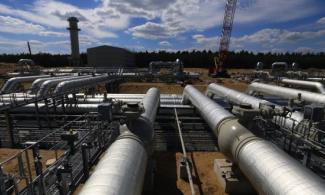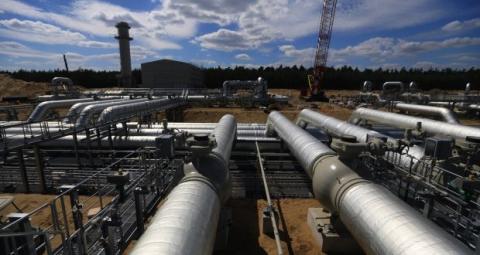
SaharaReporters gathered that if Nigeria fails in its appeal at the UK court, P&ID would be allowed to seize $9 billion in assets from Nigeria.
The Nigerian government has asked a London court to give the country more time to appeal the $9.6 billion arbitration award in the legal tussle between the country and P&ID (Process & Industrial Development Ltd) over the 2010 gas supply contract.
At the virtual hearing of the Nigeria appeal against P&ID on Tuesday, Nigeria's lawyer, Mark Howard, told Ross Cranston, a UK judge, that the Economic and Financial Crimes Commission (EFCC) had discovered payments to people involved in the project and their family members including Vera Taiga, whose mother, Grace Taiga, was a director in the Ministry of Petroleum Resources at the time the contract was signed.
Howard said one payment of $4,969.50 was made on December 30, 2009, and another $5,000 was paid to her on January 31, 2012, adding that P&ID claimed those payments were for health expenses.

A report by Bloomberg on Wednesday indicated that Nigeria was seeking more time to pursue its accusations that the 2010 gas-supply deal with P&ID was a scam and designed to defraud the nation.
SaharaReporters gathered that if Nigeria fails in its appeal at the UK court, P&ID would be allowed to seize $9 billion in assets from Nigeria.
This situation would be catastrophic for Nigeria should it eventually lose this appeal. $9 billion is equivalent to almost 2.5% of the country's annual GDP and more than the country earned in its oil revenue last year.
If Nigeria cannot afford to pay the sum, P&ID will be right to seize and sell the country's assets in UK territories and the United States.
Last year, a British judge upheld the arbitration award P&ID won in 2017. Still, Nigeria has applied to US courts seeking documents from 10 banks, including Citigroup Inc. and JPMorgan Chase & Co., in a bid to prove its corruption allegations against the P&ID.
TheCable quoted Nigeria's lawyer, Mark Howard, as saying at the opening of the two-day hearing: "It is very unusual in a fraud case to discover a single smoking gun. By its very nature, fraud is conducted in secret, which makes it hard to detect and justifies an extension."
TheCable quoted the lawyer as telling the court in a virtual session, "If Grace Taiga was in financial strain and she asked for the money from P&ID at this critical point, and P&ID paid her in secret at precisely the time the GSPA was being put forward. That, in anybody's language, is a bribe.
"The nature of a bribe is not affected by what the bribe intends to spend the money on; the point is it is corrupt and improper to make payments to a government official when you are in the process of negotiating a contract with the government."
The lawyer said Taiga seemed to have a pattern of receiving money from companies seeking government contracts as she also received money from two companies bidding for gas infrastructure projects.
Grace Taiga is awaiting trial to determine her role in the case. P&ID had argued earlier that Nigeria had missed the 28-day appeal deadline. However, Howard said Nigeria only uncovered information about the deal in late 2019.
"Any legal team had to make a judgment call about whether there was enough evidence to argue it was a case of fraud," he said.
Howard also told the court about how Taofiq Tijani, who chaired the government technical committee that reviewed the gas plant contract, had admitted to receiving $50,000 in cash from Neil Hitchcock, a deceased P&ID project director.
The lawyer told the court, "The first payment was cash, the rest were through the banking system. The question is what was the essence of these payments? Mr Tijani said he had significant pressure. The nature of these payments was payments we are referring to as a cash payment to Mr Tijani.
"These were hidden payments to cover up their tracks. October 19, £30,000, April 14, naira equivalent of €15,000 and same date €26,400 and €13,317. These are all payments in connection with the project, which is described on page 34.
"My Lord, you look at these payments and look at Mr Tijani concerning these payments and you see that these payments cannot be accounted for. We are putting on one side the $50,000 that Mr Tijani said he was paid in cash."
Howard argued that the contract was illegal for the onset as P&ID, a company who claimed to handle large-scale oil and gas projects, spent millions of dollars in cash which is illegal under Nigeria's money-laundering laws.
He said the company knew that it could not perform the project and thus, never, paid for the land where the plant was to be built. "P&ID knew it could not perform such a huge contract, got the contract awarded through bribes and it knew it would extract money from Nigeria through arbitration or a settlement," he said.
The outcome of the current hearing will determine if Nigeria can continue its appeal to overturn the judgment against it in which P&ID secured a $ 9. 6 billion arbitral awards against the country.
Nigeria has been making moves to overturn the judgment. It has obtained court clearance to request documents from a P&ID stakeholder and review bank statements of ex-President Goodluck Jonathan, as well as, former Minister of Petroleum late Rilwanu Lukman and Diezani Alison-Madueke.
Nigeria's lawyers are seeking another hearing for the judge to decide whether misconduct has taken place and whether it justifies overturning the contract.